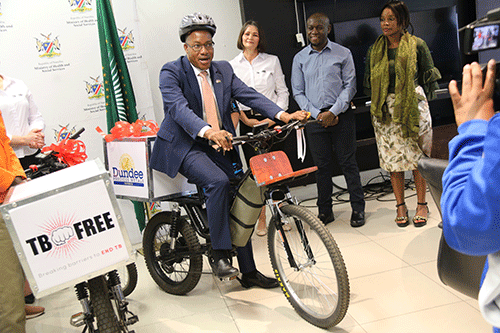Dundee Precious Metals has donated two e-bikes to enable community healthcare workers in Tsumkwe to efficiently reach more areas.
The Tsumkwe constituency is known as the hotspot for drug-resistant TB, and it reports the highest number of drug-resistant TB in Namibia.
The e-bikes, which were donated to the TB Free Foundation through the health ministry, are valued at N$61 000.
“Tuberculosis remains a significant public health concern in Namibia and Tsumkwe; it is a leading cause of morbidity, something that is exacerbated by factors such as long distances, which make it possible for communities to access healthcare services,” health ministry executive director Ben Nangombe said during the handover recently.
He said the donation will play a crucial role in enhancing the ability of healthcare workers to reach and trace TB patients and deliver medication in these areas.
“The bikes are intended to benefit the community of Tsumkwe as the beneficiaries of this initiative because during the World TB Day commemoration in Tsumkwe in April this year, the TB Free Foundation, in collaboration with Dundee Precious Minerals, donated a cheque to the amount of N$61 000 to the ministry,” added Nangombe.
He said this amount was used to procure two e-bikes to be used in the prevention and control as well as the management of drug-resistant TB in Tsumkwe constituency.
In 2022, the ministry reached 1 900 community members and picked up 42 new patients with TB.
“With increased mobility, the e-bikes will enable the community healthcare workers to cover larger distances more efficiently and effectively to identify patients, deliver results and manage close contacts of patients in the villages and posts in the Tsumkwe and Mangetti Dune areas,” said Nangombe.
He said, “With these bikes, the healthcare teams will be able to reach remote communities, conduct screenings and deliver essential medical services to those in need. Ultimately, this will accelerate and improve the identification, diagnosis and treatment of tuberculosis cases”.
Immunologist, Dr Taime Tashnica Sylvester said in Namibia, TB wreaks havoc not only on the healthcare system but also in society, with the country ranked top 10 globally with the highest TB per capita.
“No patient must be left behind, and the missing cases must be identified and tested, as well as initiated on the proper treatment regimen promptly,” she said.
Representing the TB Free Foundation, Sylvester added that there are various challenges encountered by both community healthcare workers and patients, who usually default on a loss to follow-up.
She said, “We believe the introduction of these e-bikes will improve patient adherence, increase health-seeking behaviour among patients as well as sustainable healthcare practices”.


